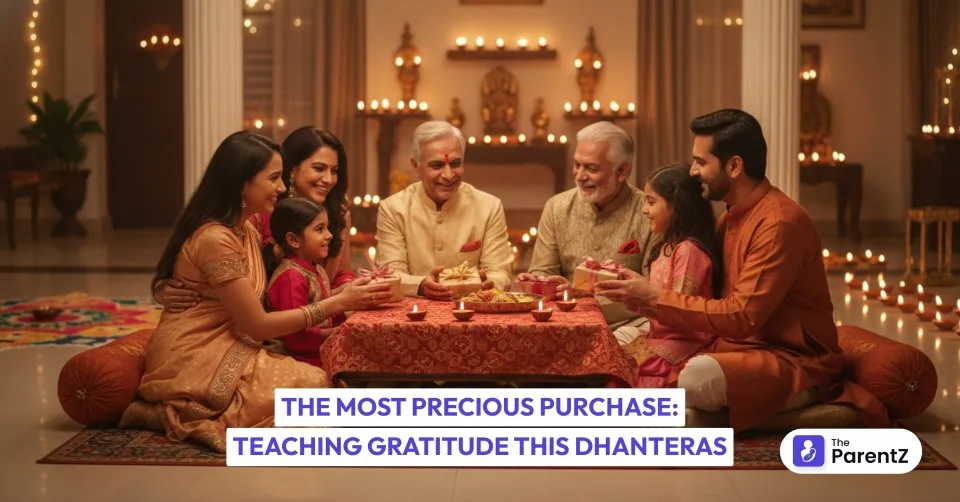It's Dhanteras evening, and your living room is glowing with diyas. Your child is jumping with excitement, asking, "What are we buying today?"
We've all been there. Dhanteras has become synonymous with shopping, including gold, silver, gadgets, and utensils. The excitement is real, the festive energy is contagious, and who doesn't love a good shopping spree? But here's a thought: what if, this year, alongside that gold coin or new pressure cooker, we also invest in something truly priceless? What if we teach our kids gratitude?
Introducing Dhanteras to Kids
Dhanteras comes just before Diwali and marks the start of five days of celebration. The name says it all: “Dhan” means wealth, and “Teras” means the thirteenth day. On this day, people pray to Goddess Lakshmi for wealth, happiness, and prosperity, and to Lord Dhanvantari for good health.
There are wonderful stories to share with children. One is about Lord Dhanvantari, who appeared from the ocean with a pot of Amrit (nectar), bringing the gift of health to the world. Another speaks of King Hima’s wife, whose love and cleverness saved her husband by lighting diyas and stacking coins to keep danger away. These tales show that the festival is about more than shopping; it’s about hope, cleverness, and keeping the light alive in our homes and hearts.
Why Gratitude Fits Right In
With every festival, families talk about what to buy: gold coins, new utensils, maybe a new dress. But have you ever taken the time to sit together and count the blessings already in your home? Dhanteras teaches us about abundance, not just in gold and gifts, but in love, kindness, and togetherness.
This is a perfect moment to talk to kids about counting what they have, not just what they want. Let them see that the greatest “wealth” is a loving family, good health, and happy memories.
Simple Ways to Practice Gratitude
- Family Gratitude Diya Challenge: For every diya your child lights, they name one thing they're thankful for. It could be their favorite toy, their best friend, that dal-chawal you made yesterday, or even their annoying little brother. You go first. Kids learn by watching us, not by listening to our lectures. When they hear you say, "I'm grateful for our cozy home" or "I'm thankful we can all sit together for dinner," they get it. They really do.
- Gratitude Rangoli: As you decorate the doorstep with rangoli, let the kids draw symbols or write words for all the good things they’re grateful for, like health, family, or even their favorite food!
- Thank-You Notes: Help your child write thank-you notes for family, friends, or teachers. Slip them into Diwali cards or just hand them out with a sweet smile.
- Gratitude Puja: Before you do your regular prayers, invite your kids to say thank you to the gods, not just for presents, but for each other, the food on the table, and even the roof above your heads.
Shopping with Meaning
Shopping is fun! It’s a festival, after all. But include your kids in the process; ask what’s really needed at home and why it matters. Maybe this year, let them help pick something for someone else in need as a family project. The joy of giving can be just as big as the joy of getting.
When kids help choose gifts or donations, they learn that real wealth comes from sharing and caring. A small act, like a box of sweets for the security guard or a set of diyas for a neighbor who can’t afford their own, can become a priceless family tradition.
Before buying something new, spend five minutes talking about something old you already have that you love. That old pressure cooker that's been with your family for years? The silver payal your grandmother gave you? Your child's first birthday gift?
This isn't about making them feel guilty for wanting new things. Not at all! It's about helping them understand that joy comes from appreciating what we have, not just from getting more.
Conclusion
On Dhanteras evening, families light diyas, clean the house, and welcome Goddess Lakshmi. Remind children why we do all this: not just for luck, but to fill our spaces with light, warmth, and good wishes for everyone, including those who may not have as much as us.
Celebrate with simple joy. Prepare a homemade sweet, recite a favorite family story, and let the excitement be less about what’s new and more about what’s precious, each other.





Be the first one to comment on this story.